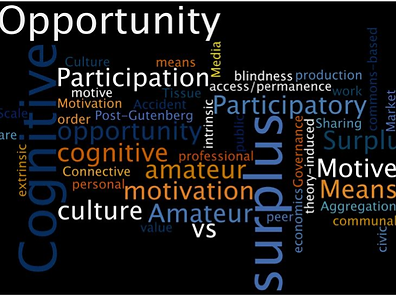
Erin Workman
ePortfolio for Digital Revolution and Convergence Culture

Collaborative Learning and Collective Intelligence
As I discuss in my ePortfolio reflection, collaboration was not always as productive for me (or, I would tentatively suggest, for the group) as I would have liked. Reflecting now on each instance of collaboration linked under this tab, I notice a couple of trends that might account for non/productive collaboration.
1. Meeting, either in person, or synchronously online: For three of these posts, I met with my group members either in person or at the same time on our Google Doc. These meetings enabled us to have a dialogue that I notice as absent from the two posts for which my group did not meet. We were able to work through our initial ideas and to discuss points of divergence using either the chat function of Google Docs or group emails. For instance, as I worked with David, Kendall, Joe, and Sarah, we made a document through our dialogue: each of us added our own text and responded to what others had said. After each of us had contributed to the document, we each claimed one major portion for revision, and I took the synthesis portion of the document. While I was composing my text, I was not confident in the claims I was putting forth, nor did I feel that I was coherently presenting my or the group's ideas. David was on chat, and he encouraged me in the work that I was already doing and made suggestions for how I might continue composing the text. This dialogue helped me to work through the issues I was having, and it also made me feel more confident in my ideas. In contrast to these experiences, for the two blog postings where my group did not meet, each member ended up posting text that was not always synthesized into a coherent whole. In one case, an attempt was made, but not all group members were available at the time the document needed to be posted. Because of this lack of communication, I feel our documents do not work as well as they could have.
2. Having a clear sense of one's task: Though my groups did not often struggle with developing an understanding of the purpose of the assignment, we did sometimes struggle with our individual tasks; that is, we did not always understand what each member was contributing to the collaborative documents. Understanding our tasks seems strongly connected to meeting: for the posts where my groups did meet, we were able to work through what each of us felt comfortable contributing; for the posts where my group did not meet, we each added chunks of material that sometimes repeated what came before or was not apparently connected to the material. Having a sense of task enabled my group members and I to create synthesized and clearly organized documents, which I think is an important goal for this type of group work.